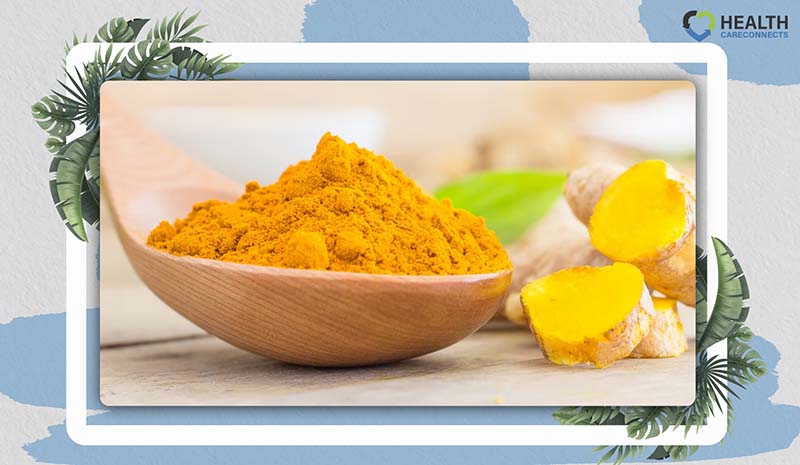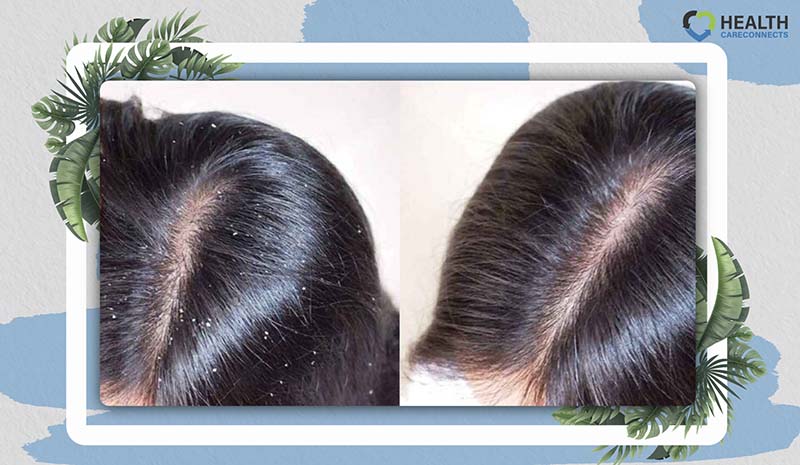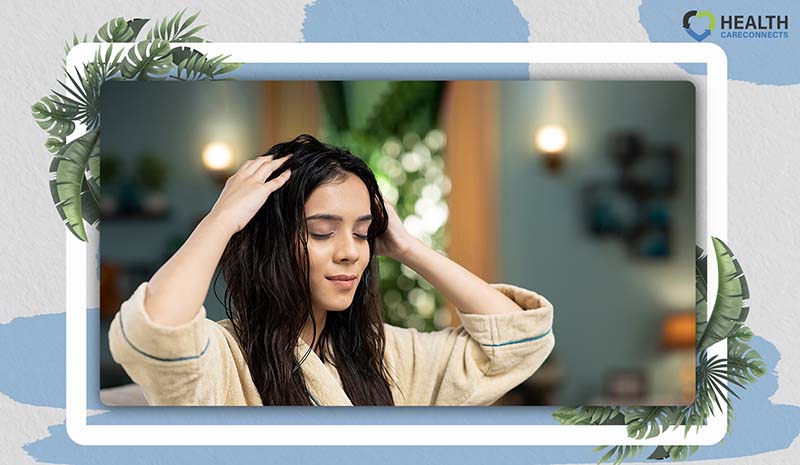Turmeric is renowned for its health benefits, but have you considered its effects on hair health? This blog addresses the question, “Is turmeric good for hair?”
We will explore how this ancient spice helps combat dandruff, regulate oil production, and improve scalp health. Read on to learn how you can integrate turmeric into your hair care routine for stronger, healthier hair
Is Turmeric Good for Your Hair?
Turmeric is effective in improving hair and scalp health and helps in hair loss prevention. It is often used in hair masks to treat scalp issues such as dandruff, psoriasis, and even mild acne.
This herbal treatment is an excellent home remedy that can help with scalp nourishment. However, when it comes to promoting hair growth, its effectiveness is less certain.

5 Advantages of Turmeric for Hair
Turmeric offers numerous benefits for hair due to its anti-inflammatory properties. According to William Gaunitz, WTS, a certified trichologist and founder of Advanced Trichology, its versatile range makes it a valuable ingredient in various hair care products, including shampoos, conditioners, hair masks, and treatment oils. Here are five advantages of applying turmeric to your hair:
Combats Dandruff
Turmeric’s anti-inflammatory and antibacterial properties can effectively help with dandruff. According to Dr. Dendy Engelman, a board-certified cosmetic dermatologist, when dandruff is left untreated, it can eventually lead to hair loss.
Treating the hair with turmeric keeps the scalp healthy, which is essential for maintaining healthy hair and promoting new hair growth.

Regulates Oil Production
Turmeric is excellent for treating oily hair and scalps due to its anti-inflammatory and anti-microbial properties. Dr. Engelman explains that these anti-microbial properties inhibit the growth of microorganisms, which oily scalps are prone to, thereby regulating oil production.
Prevents Hair Loss
Turmeric’s anti-inflammatory properties are beneficial for thinning hair as they may stimulate growth. Gaunitz notes that most hair loss is caused, at least in part, by inflammation. Reducing inflammation helps mitigate the impact of pattern hair loss or directly inflammatory hair loss on the scalp and hair follicles.

Enhances Scalp Health
The anti-inflammatory benefits of turmeric provide an overall boost to scalp health. Dr. Engelman, states that turmeric’s healing and anti-inflammatory properties naturally alleviate scalp irritation, unlike other products that rely on artificial ingredients. This makes turmeric a great natural addition for a healthy scalp and hair.

Protects Hair from Environmental Stressors
Turmeric’s antioxidant properties protect hair follicles from damage by free radicals. Free radicals can harm your hair, scalp, and complexion, but antioxidants like turmeric effectively combat these harmful molecules, preserving hair health.
Understanding the Impact of Turmeric on Hair Growth
Turmeric has several benefits for hair, particularly due to its anti-inflammatory properties. Let’s explore how it can promote hair growth:
Stimulates Blood Circulation
The curcumin compound in turmeric has been shown to increase blood circulation in the scalp. Improved blood flow means more nutrients and oxygen are delivered to the hair follicles, which can help them grow stronger and healthier.
Antimicrobial Effects
Turmeric has antimicrobial properties that can help fight fungal infections, which might impede hair growth. Keeping the scalp free from infections ensures a healthier environment for hair to thrive.
Prevents Hair Loss
Turmeric’s anti-inflammatory powers are particularly beneficial for thinning hair. By reducing inflammation, turmeric can potentially stimulate growth and prevent hair loss, making it a valuable addition to hair care routines.
Notes:
- Application: Use turmeric-infused oils or masks to maximize its benefits for hair growth.
- Consistency: Regular application is key to seeing improvements.
- Holistic Approach: Combine topical treatments with dietary turmeric to enhance overall effects on hair health.
Potential Negative Effects of Applying Turmeric to Hair
Turmeric is generally a safe ingredient. However, like any supplement, it’s important to use it as recommended to avoid side effects and safety issues.
According to the National Center for Complementary and Integrative Health (NCCIH), curcumin and turmeric products are considered “probably safe” when used orally or applied to the skin in the recommended amounts.
Digestive Problems
When consumed in large quantities, turmeric can cause digestive problems such as nausea, diarrhea, and abdominal pain.
Skin Reactions
When applied directly to the skin, turmeric can cause contact dermatitis and/or urticaria (hives).
Other Side Effects
Reported side effects of curcumin may include headache, diarrhea, rash, yellow stool, and increases in your levels of certain enzymes, including alkaline phosphatase and lactate dehydrogenase.
Allergies
You may be more likely to develop side effects from turmeric or curcumin if you have an existing allergy to plants of the Curcuma genus.
To reduce your risk of side effects, make sure to only take turmeric and/or curcumin products at the recommended dosage. If you experience persistent or severe side effects, it’s best to talk to your healthcare provider for personalized assistance and advice.
Staining
While not a traditional side effect, it’s crucial to note that turmeric is a potent natural dye. This means it can easily stain clothing.
Whether you’re cooking with turmeric or applying it to your skin, make sure not to let it get on your clothes, towels, or any other items you don’t want to take on a yellow color.
Notes:
- Patch Test: Always perform a patch test before applying turmeric to a larger area of your skin or scalp to check for allergic reactions.
- Protective Measures: Wear old clothing or use towels you don’t mind staining when applying turmeric treatments.
- Consultation: Consult a healthcare provider before starting any new supplement or topical treatment, especially if you have existing health conditions or allergies.
Using Turmeric for Hair Care
Turmeric can be applied topically or taken orally for hair care benefits.
Oral Use
“Turmeric can be used daily when you follow the normal recommendations for systemic use,” says William Gaunitz. Depending on the concentration, you should take between 500 and up to 2000 mg per day. However, if you’re taking turmeric orally, avoid combining it with medications that can slow blood clotting, including aspirin and ibuprofen.
Topical Applications
- Apply as a Mask: A great moisturizing DIY turmeric mask can easily be made by mixing equal parts olive oil and turmeric. Adding a small amount of honey makes the mask even more moisturizing. Apply the mask evenly and let it sit for 15 to 20 minutes to allow the ingredients to soak into the hair. Finally, rinse and cleanse your hair with your favorite shampoo and conditioner.
- Nourish Your Scalp: Combine turmeric with essential oils like lavender to create a soothing scalp treatment. This mixture can help nourish and calm the scalp, promoting healthier hair growth.
- Take as a Supplement: In addition to topical applications, turmeric can be taken as a supplement to deliver hair and skin benefits. “The best way to use turmeric for your hair is to take it internally so that it can be processed in your gut and have a systemic reduction of inflammation,” Gaunitz advises.
- Use as a Shampoo: An easy way to incorporate turmeric into your routine is by finding a shampoo that contains this “golden goddess” ingredient. Simply cleanse, rinse, and repeat for added benefits.
Notes:
- Dosage: Stick to the recommended dosage when taking turmeric supplements to avoid adverse effects.
- Patch Test: Perform a patch test before using turmeric masks or treatments on your scalp to check for allergic reactions.
- Protective Measures: Use old towels or clothing when applying turmeric topically to prevent staining.
- Consultation: Speak with a healthcare provider before starting any new supplement regimen, especially if you have existing health conditions or are taking other medications.
FAQs
Can I use turmeric powder on my hair?
Yes, combine it with olive oil and honey to create a nourishing hair mask for better absorption and distribution.
How often should I use turmeric on my hair?
The frequency depends on the method (hair mask, shampoo, scalp treatment). Use it daily or as needed.
Are there any side effects to using turmeric for hair?
When taken orally, turmeric can thin the blood. Avoid combining it with other blood-thinning medications.
Conclusion
In summary, the question ‘Is turmeric good for hair?’ finds its answer in the numerous benefits turmeric offers for hair care.
From combating dandruff and regulating oil production to enhancing scalp health and protecting against environmental stressors, turmeric proves its efficacy. By incorporating turmeric into your hair care routine, either topically or as a supplement, you can promote healthier, stronger hair.
For those seeking more information and honest product reviews, I recommend visiting HealthCareConnect.

Dr. Joyce Slater: Your Guide to Informed Health Choices
Dr. Joyce Slater shines as a distinguished expert in the field of nutrition and public health. Contributing her vast expertise to HealthConnectbc, she embodies a deep-seated passion for enhancing public well-being. As a respected figure in her field. Dr. Slater’s academic journey and professional achievements are nothing short of inspirational.
Holding a significant position as a researcher and educator, Dr. Slater has delved deeply into the intricacies of food literacy and nutritional science. Her work, prominently featured in numerous esteemed scientific publications, underscores her dedication to expanding our understanding of food’s role in health and society.
At the heart of Dr. Slater’s professional ethos is a profound desire to positively impact individual lives through education and research. She often says, “Empowering people with the knowledge to make healthier choices is the most rewarding aspect of my work.” This principle is the cornerstone of her involvement with HealthConnectbc, where she strives to provide reliable and practical health advice.
Dr. Slater’s contributions to HealthConnectbc are multifaceted: academically, she offers insights into the complex world of nutrition and health, enhancing both public understanding and professional practices. Additionally, she is instrumental in guiding and inspiring the next generation of health professionals, thus fostering future excellence in the field.
Juggling rigorous research with her educational duties, Dr. Slater demonstrates an unwavering commitment to her profession. Her approachable nature and genuine concern transcend the confines of academia, touching the lives of everyone she interacts with. Dr. Slater looks forward to continuing her journey of discovery and education, dedicated to the ongoing improvement of public health and nutrition.
At HealthConnectbc, Dr. J. Slater is not just a contributor; she is a guiding light, dedicated to enlightening and motivating individuals towards a healthier and more informed lifestyle.
PUBLISHED ARTICLES
- Food literacy competencies: A conceptual framework for youth transitioning to adulthood (2018)
- Self-perceived eating habits and food skills of Canadians (2016)
- Challenges to acquiring and utilizing food literacy: Perceptions of young Canadian adults (2016)
- Socio-demographic and geographic analysis of overweight and obesity in Canadian adults (2009)
- Sustainable well-being: Concepts, issues, and educational practices (2014)

